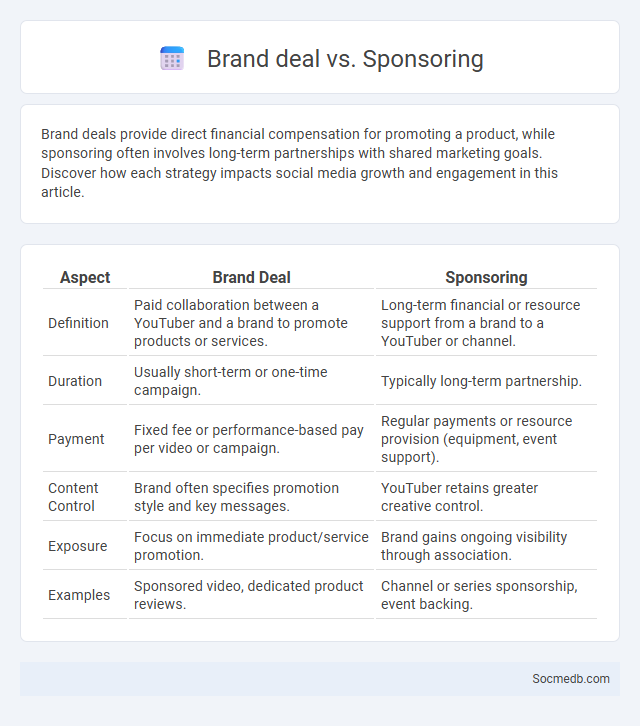
Photo illustration: Brand deal vs Sponsoring
Brand deals provide direct financial compensation for promoting a product, while sponsoring often involves long-term partnerships with shared marketing goals. Discover how each strategy impacts social media growth and engagement in this article.
Table of Comparison
| Aspect | Brand Deal | Sponsoring |
|---|---|---|
| Definition | Paid collaboration between a YouTuber and a brand to promote products or services. | Long-term financial or resource support from a brand to a YouTuber or channel. |
| Duration | Usually short-term or one-time campaign. | Typically long-term partnership. |
| Payment | Fixed fee or performance-based pay per video or campaign. | Regular payments or resource provision (equipment, event support). |
| Content Control | Brand often specifies promotion style and key messages. | YouTuber retains greater creative control. |
| Exposure | Focus on immediate product/service promotion. | Brand gains ongoing visibility through association. |
| Examples | Sponsored video, dedicated product reviews. | Channel or series sponsorship, event backing. |
Understanding Brand Deals: Definition and Scope
Brand deals in social media refer to partnerships where influencers or content creators promote products or services to their audience in exchange for compensation, often involving sponsored posts, videos, or endorsements. These collaborations can range from single posts to long-term ambassadorships, impacting your online credibility and revenue potential. Understanding the scope of brand deals helps you negotiate better terms and align with brands that match your personal or business values.
What is Sponsorship? Key Characteristics
Sponsorship in social media involves a brand financially supporting content creators or influencers to promote their products or services, enhancing visibility and engagement. Key characteristics include targeted audience reach, authentic content integration, measurable ROI through analytics, and alignment between the sponsor's values and the influencer's niche. Your brand benefits from increased credibility and direct access to a highly engaged community.
Brand Deal vs. Sponsorship: Core Differences
Brand deals typically involve short-term collaborations where you promote a specific product or service in exchange for payment, focusing on immediate marketing goals. Sponsorships are longer-term partnerships that often include broader support, such as event backing or ongoing brand alignment, enhancing your overall brand image and reach. Understanding these core differences helps you choose the right strategy to maximize engagement and revenue on social media platforms.
Objectives Behind Brand Deals
Brand deals drive exposure, increase revenue, and enhance credibility for businesses on social media platforms. Your content strategically targets desired demographics to maximize engagement and foster loyalty. Clear objectives include boosting brand awareness, expanding reach, and generating measurable conversions through influencer partnerships.
Goals and Benefits of Sponsorship
Sponsorship in social media enhances brand visibility and drives targeted engagement by associating your brand with relevant influencers or events. This strategy boosts credibility and expands audience reach, leading to increased conversions and customer loyalty. Measuring clear goals such as brand awareness, lead generation, and customer retention ensures your sponsorship delivers measurable ROI.
Collaboration Models: Brand Deals Explained
Brand deals in social media collaboration models involve partnerships between influencers and brands where creators promote products or services in exchange for compensation. These collaborations leverage the influencer's audience to increase brand visibility and drive engagement, often through sponsored posts, product placements, or affiliate marketing. Effective brand deals are characterized by clear agreements on deliverables, content guidelines, and performance metrics to ensure mutual benefit.
Sponsorship Strategies and Approaches
Effective sponsorship strategies on social media leverage targeted audience insights and platform-specific content to maximize brand visibility and engagement. Brands tailor their approaches by collaborating with influencers who resonate with Your niche, ensuring authentic promotion and deeper connections. Utilizing data analytics to track campaign performance enables continuous optimization and higher return on investment.
Legal and Financial Aspects: Comparison
Legal and financial aspects of social media involve compliance with data protection laws such as GDPR and CCPA, along with managing intellectual property rights and advertising regulations. Financially, platforms generate revenue through targeted advertising, subscription models, and influencer marketing, which require transparent financial reporting and regulatory adherence. Comparing major platforms like Facebook, Twitter, and TikTok reveals differences in monetization strategies, legal challenges, and compliance approaches that impact both users and investors.
Choosing Between Brand Deal and Sponsorship
Choosing between a brand deal and a sponsorship depends on your long-term goals and content alignment. Brand deals typically offer one-time payments for specific deliverables, while sponsorships often involve ongoing partnerships with consistent exposure. Evaluating your audience engagement and negotiating terms can help maximize Your revenue and brand growth.
Best Practices for Successful Brand Partnerships
Collaborating with influencers and brands that align with Your values ensures authentic engagement and strengthens brand credibility on social media platforms. Consistent content creation paired with transparent communication fosters trust and long-term loyalty among your audience. Data-driven strategies, including performance analytics, optimize campaign effectiveness and maximize return on investment for successful brand partnerships.
 socmedb.com
socmedb.com